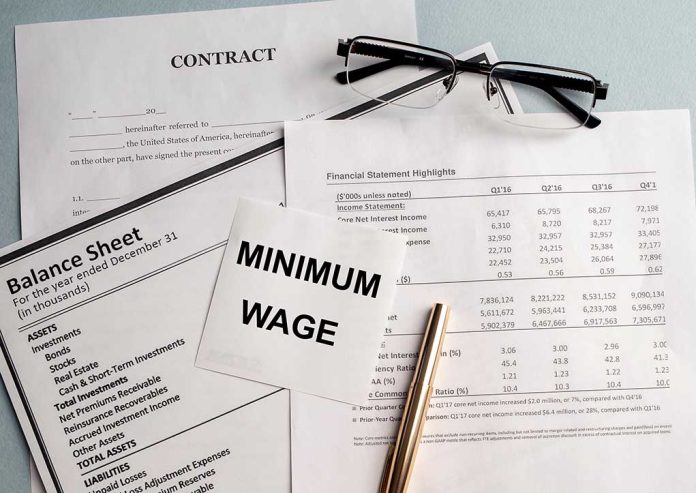
Michigan’s Supreme Court orders minimum wage hike to $15 by 2028, sparking debate on economic impacts.
At a Glance
- Michigan’s minimum wage to increase to $12.48 per hour in February 2025
- Gradual increases will lead to $15 per hour by 2028
- Tipped minimum wage to be eliminated by 2030
- New paid sick leave standards to be implemented
Michigan Supreme Court Mandates Significant Wage Increases
The Michigan Supreme Court has issued a landmark ruling that will significantly impact the state’s minimum wage structure. Starting February 21, 2025, the minimum wage will rise from the current $10.33 to $12.48 per hour. This marks the beginning of a series of incremental increases aimed at reaching $15 per hour by 2028. The decision has reignited discussions about economic feasibility and the potential strain on businesses.
The court’s ruling outlines a specific schedule for wage increases: $13.29 in 2026, $14.16 in 2027, and $14.97 in 2028. These figures will be subject to inflationary adjustments, potentially pushing the 2028 rate to $15 or higher. The decision also addresses the contentious issue of tipped wages, mandating the elimination of the reduced tipped wage for servers by 2030.
Controversy and Economic Concerns
The ruling has not been without controversy. It was a close 4-3 decision, with Democratic-nominated justices forming the majority. Two justices dissented, highlighting the divisive nature of the issue. Business leaders and restaurant industry officials have expressed significant concerns about the economic impact of these wage changes.
“We didn’t ask for this, and we are not out picketing for a higher wage,” said Marianne Hayoz, owner and operator of The Peppermill Cafe in Grand Rapids.
The decision has sparked a debate about the balance between fair wages and business sustainability. Some argue that the increases are long overdue and necessary for workers’ livelihood, while others fear it could lead to job losses and business closures, particularly in the restaurant industry.
Implementation Challenges and Clarity Requests
The implementation of these changes is not without its challenges. The Michigan Department of Treasury has requested clarity from the Supreme Court regarding the interpretation and implementation of inflation adjustments for the graduated wages from 2025 through 2028. This highlights the complexity of enacting such sweeping changes to wage structures.
“Respectfully, the Michigan Department of Treasury has read this Court’s opinion in earnest and believes there exist ambiguities as to how to interpret and implement this Court’s directives in accounting for inflation for the graduated wages for the 2025 through 2028 time period,” Attorney General Dana Nessel’s office wrote in a motion filed Wednesday on behalf of the state departments of Treasury and Labor and Economic Opportunity.
Additional Labor Reforms
Beyond wage increases, the ruling also mandates new paid sick leave standards. Nearly all Michigan employers must offer 72 hours of sick leave annually, with varying paid leave requirements based on employer size. Small businesses with fewer than nine employees can limit paid sick time to 40 hours a year. These changes aim to provide better working conditions and job security for Michigan workers.
The Michigan Supreme Court’s decision marks a significant shift in the state’s labor landscape. As the implementation date of February 21, 2025, approaches, businesses and workers alike will need to prepare for these substantial changes. The coming years will likely see continued debate and potential adjustments as the state navigates this new terrain of increased minimum wages and expanded worker benefits.





